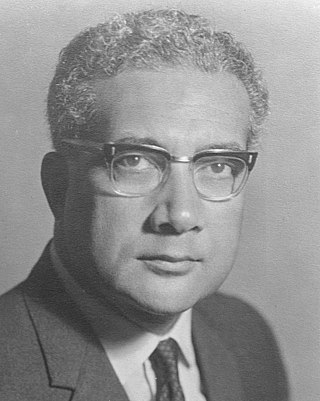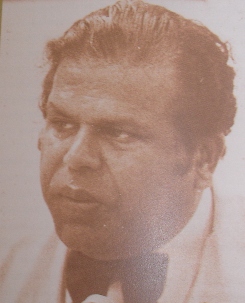
The politics of Fiji take place within the framework of a parliamentary representative democratic republic. Fiji has a multiparty system with the Prime Minister of Fiji as head of government. The executive power is exercised by the government. Legislative power is vested in both the government and the Parliament of Fiji. The judiciary is mostly independent of the executive and the legislature.

Ratu Sir Kamisese Mara, was a Fijian politician, who served as Chief Minister from 1967 to 1970, when Fiji gained its independence from the United Kingdom, and, apart from one brief interruption in 1987, the first Prime Minister from 1970 to 1992. He subsequently served as President from 1993 to 2000.

The national flag of Fiji was adopted on 10 October 1970. The state arms have been slightly modified but the flag has remained the same as during Fiji's colonial period. It is a defaced cyan "Blue Ensign", with the shield from the national coat of arms. It has remained unchanged since Fiji was declared a republic in 1987, despite calls from some politicians for changes.

The Senate of Fiji was the upper chamber of Parliament. It was abolished by the 2013 Constitution of Fiji, after a series of military coups. It was the less powerful of the two chambers; it could not initiate legislation, but could amend or veto it. The Senate's powers over financial bills were more restricted: it could veto them in their entirety, but could not amend them. The House of Representatives could override a Senatorial veto by passing the bill a second time in the parliamentary session immediately following the one in which it was rejected by the Senate, after a minimum period of six months. Amendments to the Constitution were excepted: the veto of the Senate was absolute. Following the passage of a bill by the House of Representatives, the Senate had 21 days to approve, amend, or reject it; if at the expiry of that period the Senate had done nothing about it, it was deemed to have passed the bill.

The prime minister of Fiji is the head of government of the Republic of Fiji. The prime minister is appointed under the terms of the 2013 Constitution. The prime minister is the head of the Cabinet and appoints and dismisses ministers.

The Great Council of Chiefs is a Fijian constitutional body. It previously existed from 1876 to March 2012 and was re-established in May 2023.

Siddiq Moidin Koya was a Fijian Indian politician, Statesman and Opposition leader. He succeeded to the leadership of the mostly Indo-Fijian National Federation Party (NFP) on the death of the party's founder, A. D. Patel, in October 1969, remaining in this post until 1977. He later served a second term as leader of the NFP, from 1984 to 1987.

Ratu Sir George Kadavulevu Cakobau was Governor-General of Fiji from 1973 to 1983. A great-grandson of Ratu Seru Epenisa Cakobau, the King of Bau who had unified all the tribes of Fiji under his reign in the mid-1800s and subsequently ceded the islands to the United Kingdom in 1874, Ratu Sir George held the traditional titles of Vunivalu of Bau and Tui Levuka and thus was considered by many as Fiji's highest-ranking traditional chief. Ratu Cakobau was appointed Governor-General in 1973, becoming the first indigenous Fijian to serve as the representative of Elizabeth II, Queen of Fiji.
The 1997 Constitution of Fiji was the supreme law of Fiji from its adoption in 1997 until 2009 when President Josefa Iloilo purported to abrogate it. It was also suspended for a period following the 2000 coup d'état led by George Speight.

The National Federation Party is a Fijian political party founded by A.D. Patel in November 1968, as a merger of the Federation Party and the National Democratic Party. Though it claims to represent all Fiji Islanders, it is supported, in practice, almost exclusively by Indo-Fijians whose ancestors had come to Fiji between 1879 and 1916, mostly as indentured labourers. However, in the 2018 general election, the party recorded a considerable change in its support base due to the inclusion of more indigenous Fijian candidates.
Ratu is an Austronesian title used by male Fijians of chiefly rank. An equivalent title, adi, is used by females of chiefly rank. In the Malay language, the title ratu is also the traditional honorific title to refer to the ruling king or queen in Javanese culture. Thus in Java, a royal palace is called "keraton", constructed from the circumfix ke- -an and Ratu, to describe the residence of the ratu.

Fiji's parliamentary election of March 1977 precipitated a constitutional crisis, which was the first major challenge to the country's democratic institutions since independence in 1970.

The chief justice is Fiji's highest judicial officer. The office and its responsibilities are set out in Chapter 5 of the 2013 Constitution of Fiji. The Chief Justice is appointed by the President on the advice of the Prime Minister.

The Colony of Fiji was a Crown colony that existed from 1874 to 1970 in the territory of the present-day nation of Fiji. London declined its first opportunity to annex the Kingdom of Fiji in 1852. Ratu Seru Epenisa Cakobau had offered to cede the islands, subject to being allowed to retain his Tui Viti title. His demand was unacceptable to both the British and to many of his fellow chiefs, who regarded him only as first among equals, if that. Mounting debts and threats from the United States Navy had led Cakobau to establish a constitutional monarchy with a government dominated by European settlers in 1871, following an agreement with the Australian Polynesia Company to pay his debts. The collapse of the new regime drove him to make another offer of cession in 1872, which the British accepted. On 10 October 1874, Britain began its rule of Fiji, which lasted until 10 October 1970.
Since attaining independence from the United Kingdom on 10 October 1970, Fijian history has been marked by exponential economic growth up to 1987, followed by relative stagnation, caused to a large extent by political instability following two military coups in 1987 and a civilian putsch in 2000. This was followed by another military coup in 2006. Rivalry between indigenous Fijians and Indo-Fijians, rather than ideological differences, have been the most visible cleavage of Fijian politics. Later in 2020, Fiji was hit by the global COVID-19 pandemic, which affected the economy and the daily lives of the people.

Fiji was an independent state from 1970 to 1987, a Commonwealth realm in which the British monarch, Elizabeth II, remained head of state as Queen of Fiji, represented by the Governor-General. The state was the successor of the British Colony of Fiji which was given independence in October 1970 and it survived until the Republic of Fiji was proclaimed on 6 October 1987 after two military coups, at which time Queen Elizabeth II was removed as head of state. During this time, Fiji's highest court was the Judicial Committee of the Privy Council, which was above the Supreme Court of Fiji in the Fijian judicial system.

Fiji's fourth constitution was signed into law by President Ratu Epeli Nailatikau on 6 September 2013, coming into effect immediately. It is the first to eliminate race-based electoral rolls, race-based seat quotas, district-based representation, the unelected upper chamber, and the role of the hereditary Council of Chiefs. It vests sole legislative authority in a single-chamber, 50-seat, at-large Parliament, to be first convened following general elections in 2014. It is also the first ever to grant the right to multiple citizenship, and lowers the voting age to 18.

The majority of Fiji's islands were formed through volcanic activity starting around 150 million years ago. Today, some geothermic activity still occurs on the is lands of Vanua Levu and Taveuni. Fiji was settled first by the Lapita culture, around 1,500–1,000 years BC, followed by a large influx of people with predominantly Melanesian genetics about the time of the beginning of the Common Era. Europeans visited Fiji from the 17th century, and, after a brief period as an independent kingdom, the British established the Colony of Fiji in 1874. Fiji was a Crown colony until 1970, when it gained independence as the Dominion of Fiji. A republic was declared in 1987, following a series of coups d'état.









